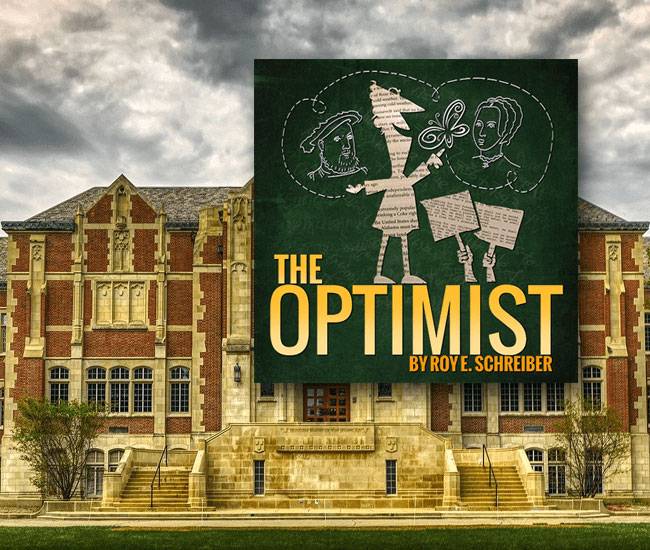Shortly after I moved to New York City right out of college, I had to get my tonsils removed — a bit unusual for an adult. A friend came by to visit and brought along a book. Understanding my state of oral incompetence, she jotted a note within: “Don’t bother saying thank you.”
A few decades later, I’ve had plenty of time to say thanks. The book was Lucky Jim by Kingsley Amis. I thought she selected it because my name was in the title — and I needed some luck. I didn’t know it then, but literary critics regard the fictional exploits of Jim Dixon, a hapless medieval history lecturer at an English university, as one of the greatest satires ever on academic life and high-class manners— the standard by which all other pokes at academia are measured.
Lucky Jim began a fascination for me with the genre that laughs at the academic community. To be successful in this category requires a certain intellect, sophistication and attitude from the author and his or her characters, regardless of whether one is seeking Amis’ status.
AN AUDIO PLAY PACKED WITH “CHARACTER” AND CLEVERNESS
That brings us to The Optimist (Author’s Republic) by Roy E. Schreiber, a quick, fun jaunt through faculty life at the imaginary Fullbright University, located in a Midwestern town that could just as well be Middle-Of-Nowhere, Indiana. The Optimist is presented as an “audio play,” part of a burgeoning trend in audiobooks away from mere voiceover and toward the theatrical—whether it be actor narration, partial to full dramatic treatments (the forthcoming adaptation of Elizabeth Strout’s My Name Is Lucy Barton springs to mind), or drama written specifically for audio or adapted from the stage (see Audible Theater).
In such a format, not only does Schreiber’s writing need to be crisp and clever but so too do the deliveries of the cast. The result is a satisfying, engaging experience, where the author does justice to his background as a British history professor. This is accomplished through a troupe of university professor characters interacting in their university professorial shticks and navigating through a variety of storylines that bring out the best in each of their personas.
We are first introduced to philosophy professor Ralph Wise and biology professor Al Green, two of the three founders of Fullbright’s sparsely represented faculty union, contemplating how to get more union participation.
Their plan is to distribute a flyer exposing the higher salaries generated at a local, prestigious, private high school, hopefully enraging their colleagues to band together under the union to fight the injustice.
As this campaign plays out, enter Chancellor Thatcher, who tries to cut off a faculty rebellion and at the same time enlists Ralph to create a lecture series in her name. (Note how she often signs off as Chancellor Thatcher, F.U.)
Ralph, in an effort to sabotage the series, shuns the slate of potential high-profile scientific lecturers and chooses instead as his initial speaker Fullbright’s own Gary Pine, a history professor and Henry VIII expert. “Expert” does not do credit to Pine’s connection with the monarch; rather, his words and actions better represent Henry VIII reincarnated. “King Henry and I seldom part company,” he says.
When Pine connects with Vivian White, a PhD. in English literature and an Anne Boleyn expert, the doors open for more plot twists.
HIGHER EDUCATION HIJINKS
Through it all, the voice of reason, in theory, is Ralph, who teaches logic and lives by it. Until, of course, he doesn’t. “Sometimes,” he says, “logic and optimism work hand in hand.” “Sometimes,” as he finds out, is not the same as “always.”
Schreiber does an admirable job mixing the camaraderie and comedy of faculty dialogue with the inevitable office romances. While the story advances swiftly, there’s still plenty for listeners to absorb from individual character studies.
While the voices of Ralph (Gary Alexander) and Al (Patrick Zeilinski) provide steady, clean narrative, Joe Dempsey as the Henriesque Gary and Sharyon Anita Culberson with her Vivian/Ann Boleyn fix are the perfect compliments with expressive personalities and performances. As an audio experience, The Optimist is high quality.
If you are fan of all things academia — faculty doings in particular — you will enjoy this work. If you are looking for logic, you’ll find your fair share. If it’s optimism you need, check off that box as well.
But, as Schreiber ponders, the world is not always as logical, or optimistic, as one would like.
The audiobook of The Optimist is now available for purchase. Learn more about Roy Schreiber on his author profile page and in our interview with the author.
https://booktrib.com/wp-content/uploads/2020/01/roy-s-1.jpg
About Roy Schreiber:
After college (UCLA and University of London), Roy Schreiber spent a good deal of time teaching British History at a branch campus of Indiana University. Like all the other professors, he wrote academic books. His were about people who lived in the 16th and 17th centuries. Only about 50 other academics in the world would even recognize their names. It seemed like a lot of effort for a small audience, so he switched to more popular topics. A short list includes the British navy, Tahiti, Australia and the U.S. Red Scare of the 1950s. Then, of course, there are the satires on academic life. Now he publishes books, both audio and print, short stories, and also writes and produces plays for the stage and for radio and podcasting.




